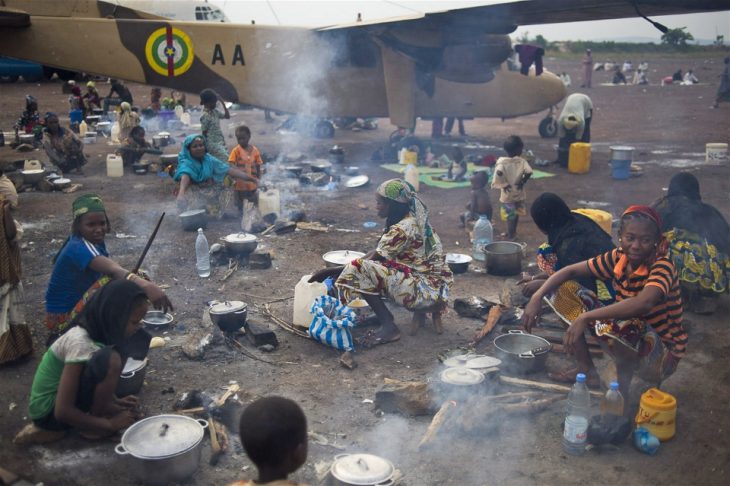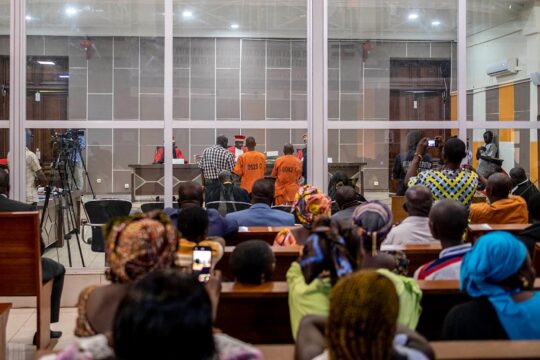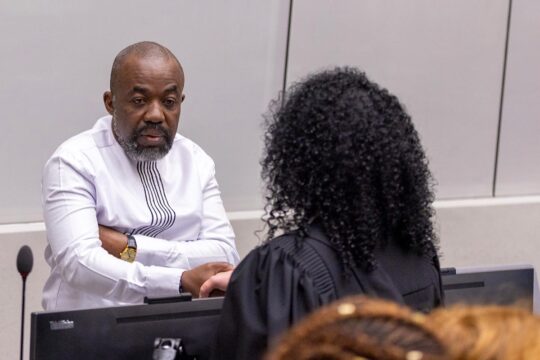After massive violations of human rights, many countries have introduced policies of forgiveness. But how do they work? This is the subject of a series of articles by Pierre Hazan, JusticeInfo.net Head of Project and associate professor at the University of Neuchatel, Switzerland. The series will look at five countries: Central African Republic, Burundi, Rwanda, South Africa and the former Yugoslavia. We start this week with the Central African Republic. On Friday next week, we will look at Burundi.
Introduction
“There are crimes which men can neither punish nor forgive.” This phrase formulated by German-born Jewish essayist Hannah Arendt strikes to the heart of an important issue and expresses the dilemma with which many societies are faced. What do you do with the perpetrators of crimes that are so terrible that punishment can never be proportionate to what they did? How do you deal with something that seems totally unforgiveable? It’s hard not to agree with Hannah Arendt, but if we do, then we are immediately confronted with a difficult choice between two paths, one which societies in transition must face. This helps to explain the multiplicity of punishment and forgiveness policies adopted by transition societies in the name of “reconciliation”, “peace and security”.
Here we will interest ourselves in forgiveness policies, where experiences to date differ widely. How do policies of forgiveness work? What is required in exchange? What kind of deals do they give rise to? Is confession a prerequisite? What is the link here between morals, politics and reconciliation, and between individual and collective forgiveness? These are the questions we will look at.
We will look at “forgiveness” policies in five countries: the Central African Republic (CAR), Burundi, Rwanda, South Africa and the former Yugoslavia. Of course, each context is different. The civil wars in the CAR, Burundi and former Yugoslavia have little in common with each other and are not comparable to the genocide of Tutsis in Rwanda or the apartheid policy in South Africa. Not only are there differences in the context of the human rights abuses committed, but also in the mechanisms chosen to deal with them. South Africa chose to set up a Truth and Reconciliation Commission (TRC), whereas it was the UN Security Council that created the International Criminal Tribunal for the former Yugoslavia (ICTY). Last but not least, the CAR only decided in May 2015 to set up, in principle, a TRC, whereas in Burundi sudden and violent repression by the regime, also starting in May 2015, calls into question whether a TRC makes any sense. But what strikes us above all is how the concept of forgiveness shifts, something that can only be understood in relation to the political ends being pursued.
1. Central African Republic: Crimes that can be both Punished and Forgiven
From May 4 to 11, 2015, the Bangui Forum took place in the Central African Republic. Its aim was to pull the country out of a crisis that has plunged it into a bloodbath the UN described a year earlier as “pre-genocidal”, in a context where the State had collapsed. The terrible violence inflicted by Seleka militia, who seized power in 2013, was followed a year later with similar, if not worse, by Anti-Balaka militia. The former targeted the Christian majority, while the latter targeted the Muslim minority. The height of violence came in December 2013 when hundreds of Muslims were massacred in the space of a few days in the ghetto known as “Kilometre Five”, or PK5.
It was thus in the context of a failing State, propped up by the international community and troops from the United Nations, the European Union and France, that the Forum took place bringing together militia leaders who had been fighting each other only a short while before, victims, young people, women’s associations, civil society and religious leaders. Very quickly the question of forgiveness was raised in plenary session and in the Commission on justice and reconciliation. Taking the microphone, militia leaders apologized for the crimes they had committed, and men and women accorded their forgiveness, even though their children and other family members had been killed and they themselves were victims of the violence. I was a lot more intrigued by the way the victims so readily and generously granted forgiveness than by the repentance of militia leaders.
Militia leaders’ repentances were expressed in general terms. Perhaps they wanted to limit the risk of being taken to court, or were hoping to get back legitimacy in the eyes of citizens as a new chapter appears on the horizon in Central African political life. On the other hand, the victims’ granting of forgiveness was all the more intriguing because at the same time the assembly rejected by an overwhelming majority any form of amnesty for perpetrators of war crimes and crimes against humanity. This decision is certainly in line with international law but it breaks with the past in the CAR, where amnesties have been the norm up to now. A female participant summed up the prevailing sentiment in a few words that resounded like a slogan in the hall of the National Assembly in Bangui: “Yes to forgiveness, no to impunity!”
So how can forgiveness and the need for justice be combined at the same time? How to rise above this contradiction? The answer was given by several people, including the Archbishop of Bangui, Monseigneur Dieudonné Nzapalainga. It was quite simple. As one woman victim said, “forgiveness is something that liberates you”.
Thus many (but not all) victims said they would not take justice into their own hands. They made a distinction between the private sphere and the public sphere. On the one hand they want to free themselves from hatred of their torturers, which they feel could trap their energy in an eternal desire for revenge and so prevent them mastering their fate. They see forgiveness as a necessary step on the road to psychological healing. But while victims stated freely that they would not take justice into their own hands, they also demanded that the State punish the perpetrators of these crimes.
So here forgiveness did not at all override the necessity for punishment. On the contrary, during the sessions of the justice and reconciliation commission and in plenary meetings of the Bangui Forum, forgiveness and punishment were put into two clearly differentiated spheres: the private sphere where the victim can, if he or she wishes, grant forgiveness; and the public sphere which remains responsible for bringing the criminals to justice. This explains the wide consensus at the Bangui Forum that the CAR authorities should continue to cooperate with the International Criminal Court (ICC), that they should set up a Special Court to try militia leaders whose cases are not taken up by the ICC, and should rebuild the country’s judicial system. The idea of a Truth and Reconciliation Commission was also approved, along with local mediation committees.
The Central African example shows how there can be a radical separation of forgiveness, which can be granted by the victim’s family (or the victim himself/herself) as long as justice is administered by a national or international court. At that point, Hannah Arendt’s strong phrase on “crimes which men can neither punish nor forgive” is turned on its head: these crimes can be both punished and forgiven.





